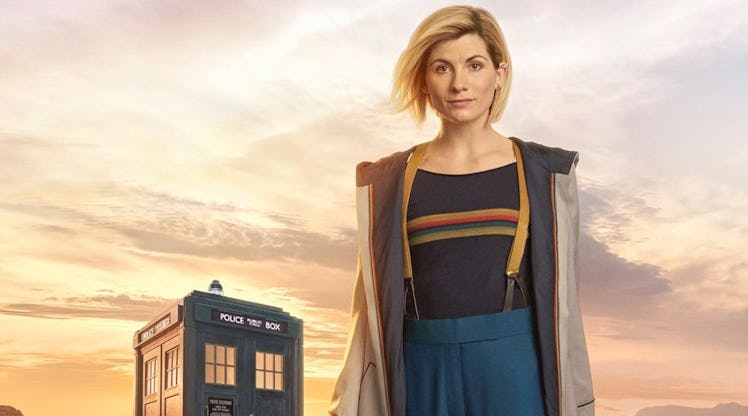
The First Female 'Doctor Who' Made Her First Appearance & Everyone Is So Excited
Christmas is more than just a religious holiday. It is also a time when humanity looks ahead to renewal. It's a time when people hold a light up in the darkest days of the year and remember that come spring, the world will bloom again. So too was the theme of this year's Doctor Who Christmas special, a yearly tradition since the show rebooted more than a decade ago. Thrice now, the Christmas episode has served as the regeneration episode for the lead character, and if the tweets about Jodie Whittaker as the new Doctor Who are any indication, fans are overjoyed and excited to see what 2018 will bring. WARNING: Spoilers for the 2017 Doctor Who Christmas special follow.
Fans have long known that this Christmas would see the end of the current iteration of the Doctor, played by Peter Capaldi, since he announced his retirement from the role nearly a year ago. But nothing could quite prepare the internet for the announcement last July that after 54 years and 12 leading men, the role would finally go to a woman. The news that the 13th Doctor would be played by actress Jodie Whittaker (who most American will recognize from shows such as Broadchurch), unleashed a joyous cry from female fans tired of being told that a woman couldn't be the Doctor because the Doctor's a man, and that's why.
On Dec. 25, fans got to meet Whittaker as the Doctor for the first time.
If this seems like a bit of an odd way to start off the part, let us compare the 13th Doctor's opening lines to those of her predecessors.
This being the end of the episode, the new Doctor wasn't on screen very long at all. But that didn't matter to fans.
One of the first details fans noticed when Whittaker appeared on screen was the musical callback to a much earlier era of the series, when David Tennant was the 10th Doctor, which many associate with the Ood.
(For those who haven't met the Ood in earlier episodes, they are portrayed as a lovely, peaceful people. Everyone loves an Ood. They also make great butlers.)
Another detail: Whittaker spoke with her own Yorkshire (northern) accent.
That is a huge deal. When the show first came back after being off the air for nearly two decades, the actor cast as the Doctor, Christopher Eccelston, fought to keep his working-class tinged northern accent. In interviews after he left, he revealed it became a huge sticking point between him, the director, and the BBC, and it one of the reasons he quit after only one season. He was replaced with David Tennant, who subsumed his own Scottish voice into a plummy, more upper class way of speaking.
It was also important for fans to give credit that the 13th Doctor's arrival was directed by one of the few women to direct episodes of the series in the show's history.
For others, it was just best to sit and be overwhelmed by the experience of losing one Doctor only to gain another.
Once the regeneration was over, though, there was a slight problem.
Like when David Tennant regenerated into Matt Smith at the end of "The End of Time Part 3", the energy output from the Doctor's changing caused the TARDIS to lurch, catch fire, explode, and crash. As one does.
For some fans, that was all a part of the awesome experience.
Some noted that you would think the Doctor would stop doing that, having seen the results before.
But those sexist angry fanboys for whom Whittaker's casting was a blow to their perception of the universe, the jokes about how this was just "typical woman driver" behavior quickly started popping up.
And just as quickly, those thoughts got shot down:
Matt Smith's crash wasn't the only one that came up, either. Capaldi's start was not exactly graceful.
Also any talk that this was the TARDIS rejecting her somehow? No.
For some fans, having the episode air on what happens to be one of the most joyful days of the year was just bittersweet.
And for all of us fans, a time of renewal.
Doctor Who Season 11 will return to the BBC and BBC America in the fall of 2018.